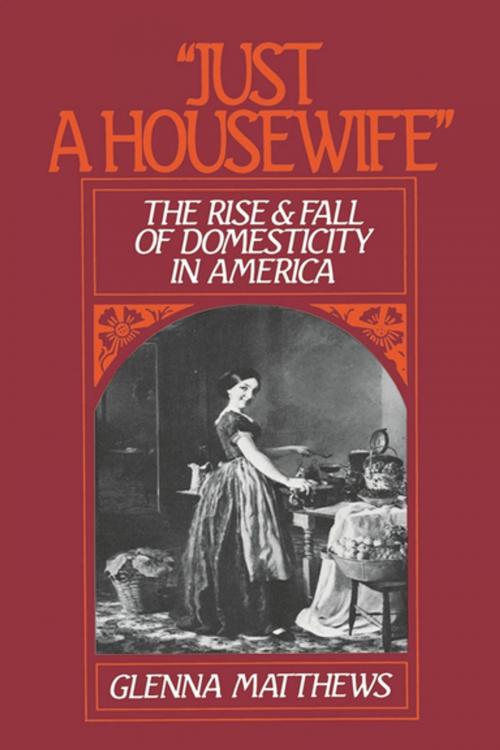"Just a Housewife"
The Rise and Fall of Domesticity in America
Nonfiction, Social & Cultural Studies, Social Science, Gender Studies, Women&, History, Americas, United States| Author: | Glenna Matthews | ISBN: | 9780190281656 |
| Publisher: | Oxford University Press | Publication: | May 11, 1989 |
| Imprint: | Oxford University Press | Language: | English |
| Author: | Glenna Matthews |
| ISBN: | 9780190281656 |
| Publisher: | Oxford University Press |
| Publication: | May 11, 1989 |
| Imprint: | Oxford University Press |
| Language: | English |
Housewives constitute a large section of the population, yet they have received very little attention, let alone respect. Glenna Matthews, who herself spent many years as "just a housewife" before becoming a scholar of American history, sets out to redress this imbalance. While the male world of work has always received the most respect, Matthews maintains that widespread reverence for the home prevailed in the nineteenth century. The early stages of industrialization made possible a strong tradition of cooking, baking, and sewing that gave women great satisfaction and a place in the world. Viewed as the center of republican virtue, the home also played an important religious role. Examining novels, letters, popular magazines, and cookbooks, Matthews seeks to depict what women had and what they have lost in modern times. She argues that the culture of professionalism in the late nineteenth century and the culture of consumption that came to fruition in the 1920s combined to kill off the "cult of domesticity." This important, challenging book sheds new light on a central aspect of human experience: the essential task of providing a society's nurture and daily maintenance.
Housewives constitute a large section of the population, yet they have received very little attention, let alone respect. Glenna Matthews, who herself spent many years as "just a housewife" before becoming a scholar of American history, sets out to redress this imbalance. While the male world of work has always received the most respect, Matthews maintains that widespread reverence for the home prevailed in the nineteenth century. The early stages of industrialization made possible a strong tradition of cooking, baking, and sewing that gave women great satisfaction and a place in the world. Viewed as the center of republican virtue, the home also played an important religious role. Examining novels, letters, popular magazines, and cookbooks, Matthews seeks to depict what women had and what they have lost in modern times. She argues that the culture of professionalism in the late nineteenth century and the culture of consumption that came to fruition in the 1920s combined to kill off the "cult of domesticity." This important, challenging book sheds new light on a central aspect of human experience: the essential task of providing a society's nurture and daily maintenance.















